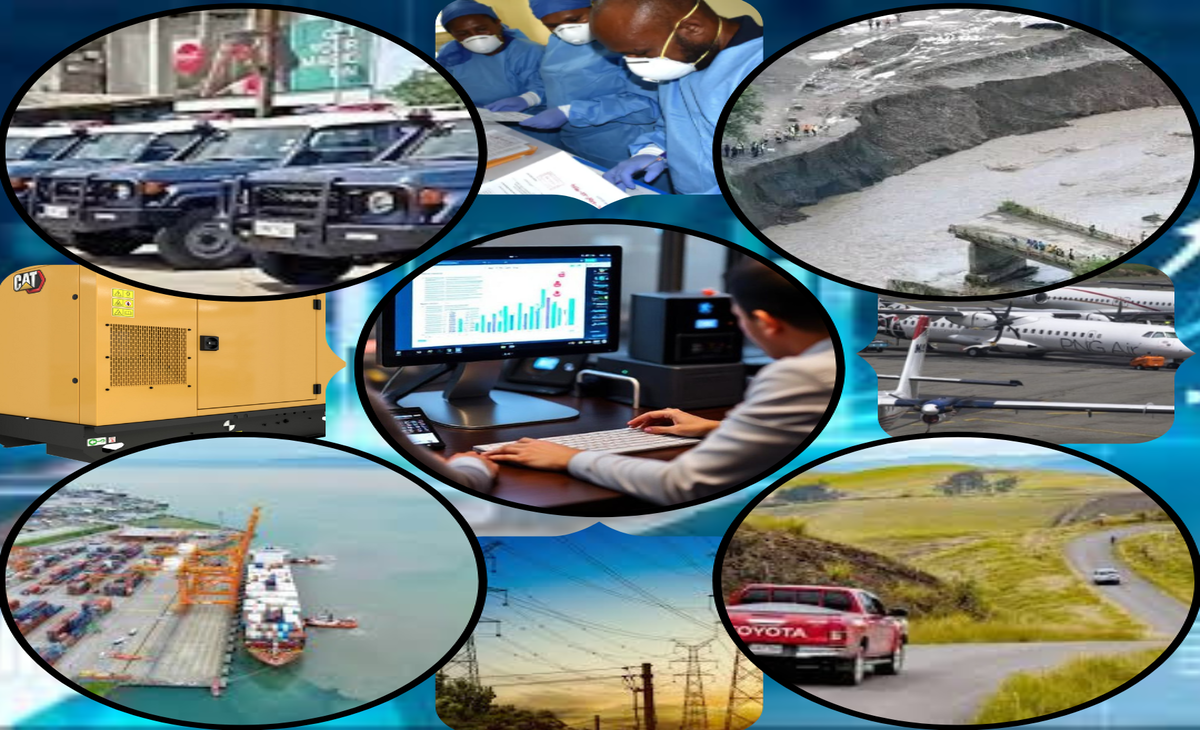Transforming Governance and Navigating the Path of Digital Innovation in PNG!

INTRODUCTION
Digital transformation is rapidly becoming a cornerstone of modern governance worldwide, and Papua New Guinea (PNG) is no exception.
As a nation striving to improve its public service delivery amidst diverse geographic and socio-economic challenges, PNG recognizes that embracing digital tools offers a path toward greater efficiency, transparency, and citizen engagement.
This journey is complex, requiring strategic planning, legal reforms, infrastructure development, and cultural shifts. The country’s efforts to modernize its public sector reflect a deliberate move to harness technological advancements for inclusive growth and sustainable development.
While the road ahead is fraught with challenges such as infrastructure gaps, funding constraints, and digital literacy issues, the progress made thus far demonstrates a strong commitment to building a digitally empowered future.
OPERATIONAL MODERNIZATION THROUGH DIGITAL TOOLS
PNG’s government is employing innovative digital technologies to revolutionize traditional bureaucratic processes. The Digital Government Plan 2023–2027 offers a well-defined roadmap, focusing on the integration of services via technological advancements. For example, online portals for licensing and land registration have replaced manual paperwork, reducing delays and corruption while improving transparency. These portals enable citizens to apply, track, and complete transactions remotely, making government services more accessible and user-friendly.
Furthermore, the adoption of cloud infrastructures allows government agencies to store and process data more securely and efficiently, facilitating better inter-agency collaboration. The deployment of digital identity systems, such as biometric or digital ID platforms, ensures secure and reliable citizen verification, which is crucial for social welfare programs and financial inclusion. The creation of secure data exchange platforms fosters real time-sharing of information across departments, enabling quicker decision-making and reducing redundancies.
This modernization effort not only streamlines operations but also lays the foundation for more sophisticated e-governance initiatives, such as predictive analytics and automated workflows, ultimately driving better policy outcomes and service quality.
SUCCESS STORIES AND FUTURE OUTLOOK: PNG’S DIGITAL TRANSFORMATION MILESTONES
PNG’s journey toward digital transformation has yielded notable successes, laying a strong foundation for future growth:
The Coral Sea Cable System: The deployment of the Coral Sea Cable System infrastructural project has significantly enhanced internet capacity and affordability nationwide, enabling more accessible digital services across remote and urban areas alike.
Digital Portals for Government Services: The introduction of online portals for services like e-passports, e health, and e-education has transformed service delivery, making it faster, more convenient, and accessible to citizens.
SevisPass: A Digital ID for PNG: The Department of Information and Communications Technology (DICT), led by Secretary Steven Matainaho, has developed SevisPass, a biometric-based digital ID system designed to streamline citizen verification. It offers enhanced security through fingerprint and facial recognition, connects with banks and government databases, and aims to provide universal access, particularly benefiting rural communities.
Digital ID Wallet and Cybersecurity Initiatives: PNG has launched the first Digital ID Wallet, facilitating secure citizen verification, and established the National Cyber Security Centre to protect against online threats.
Legal and Policy Frameworks: The implementation of the Digital Government Act 2022 and the Digital Transformation Policy establishes a robust legal foundation to underpin current digital initiatives.
Innovative Projects: Initiatives like RACHEL PLUS, a portable offline digital resource device, are being piloted to improve access to health and education in remote areas, exemplifying inclusive digital progress.
These success stories demonstrate that strategic legal reforms, technological innovation, and infrastructural investments can yield meaningful progress even within resource constraints, inspiring further efforts toward a fully digital government.
CHALLENGES FACED
While PNG has achieved notable progress, several hurdles threaten to impede its digital transformation journey:
Infrastructure Limitations: Many rural and remote communities still lack reliable internet connectivity, which limits access to digital services and deepens existing socio-economic divides.
Funding Constraints: Large-scale projects, such as comprehensive digital ID systems or nationwide broadband expansion, require substantial investment that often exceeds available budgets. This results in delays or partial implementations, hindering the full realization of digital initiatives.
Digital Literacy Gaps: Many public servants and citizens, especially in rural areas, lack the skills needed to effectively navigate and utilize new digital tools. This gap reduces the impact of digital services and can foster skepticism or resistance to change.
Cybersecurity Risks: Cybersecurity threats pose an ongoing risk, particularly given the increasing sophistication of cyberattacks worldwide. The absence of comprehensive data privacy laws and cybercrime legislation leaves sensitive government and citizen data vulnerable to breaches, undermining trust in digital systems.
Organizational and Societal Resistance: Resistance within bureaucracies, compounded by societal skepticism about digital initiatives, can slow adoption and hinder change management efforts. Addressing these cultural and institutional obstacles demands sustained effort and the adoption of inclusive engagement approaches.
OPPORTUNITIES AND FUTURE PATHWAYS
Although these hurdles exist, PNG’s digital future still appears very promising:
Regional Cooperation and Partnerships: The country’s focus on regional cooperation, especially with South Korea, provides opportunities to access advanced infrastructure, technical expertise, and regulatory support. These partnerships can accelerate capacity building and technology transfer, laying the groundwork for sustainable digital development.
Expansion of Digital Services: Expanding digital services is a key opportunity. E-government portals, online business licensing platforms, and digital health systems can significantly improve service efficiency, reduce corruption, and promote transparency. For instance, digitizing health records and appointment systems can improve healthcare delivery, especially in rural areas.
Enhancing Digital Literacy: Developing digital literacy is essential for promoting inclusivity. Implementing targeted training programs for public servants, students, and rural communities will empower citizens to fully participate in the digital economy and governance.
Embracing Emerging Technologies: Technologies such as artificial intelligence (AI), blockchain, and the Internet of Things (IoT) have the potential to transform the responsiveness and resilience of the public sector. AI can assist in policy analysis and service personalization, blockchain can enhance transparency and security, and IoT can improve infrastructure management and environmental monitoring.
Collectively, these pathways will help PNG transition from a nascent digital ecosystem to a robust, innovative, and inclusive digital society capable of addressing future challenges proactively.
CONCLUSION: KEY TAKEAWAYS AND SUMMARY
Papua New Guinea’s digital transformation journey is a compelling blend of vision, effort, and resilience. The country’s strategic policies, legal reforms, and infrastructural investments are laying a strong foundation for a more efficient, transparent, and citizen-centric government. Success stories like the Digital ID Wallet, the Coral Sea Cable, and the deployment of SevisPass exemplify the tangible progress that can be achieved through committed leadership and innovative thinking.
However, the journey is not without obstacles. Infrastructure deficits, limited funding, digital literacy gaps, and cybersecurity risks present ongoing challenges that require continuous attention, collaboration, and adaptation. The future of PNG’s digital landscape hinges on leveraging regional partnerships, embracing emerging technologies, and fostering inclusive digital literacy initiatives.
In essence:
- Digital tools are transforming operations and service delivery, making government more accessible and accountable.
- Legal, infrastructural, and technological achievements showcase substantial progress and lay the foundation for future development.
- Addressing infrastructural, financial, and societal barriers is vital to ensure that digital transformation benefits all citizens equitably.
- Strategic opportunities such as regional cooperation, innovation, and capacity building will be instrumental in shaping a resilient digital future.
FINAL THOUGHT:
Papua New Guinea’s digital transformation is both a challenge and an opportunity. With sustained commitment, strategic partnerships, and inclusive policies, PNG can unlock the full potential of digital technologies to foster sustainable development, empower its citizens, and build a more connected and prosperous nation.
Additionally, innovative approaches such as Kumulsoft’s fixed asset management software discussed in another of our blogs, play a crucial role in strengthening governance and operational efficiency, further supporting the country’s development journey.





